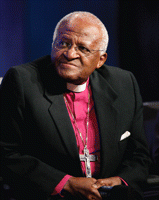One of the world's great moral leaders will speak at the Convocation of Distinguished Fellows during APA's annual meeting in Honolulu in May.
Archbishop Desmond Tutu, winner of the 1984 Nobel Peace Prize and leader of protests that led to the end of apartheid in South Africa, will present the Convocation's keynote address, the William C. Menninger Memorial Lecture.
The Convocation will be held on Monday, May 16, from 3:30 p.m. to 5 p.m. in the Kalakaua Ballroom at the Hawaii Convention Center.
Tutu is familiar to people around the globe for his quest for social justice. He was born Desmond Mpilo Tutu in Klerksdorp and educated in Ventersdorp, Krugersdorp, and Johannesburg. As an adult he enrolled at St. Peter's Theological College, was ordained as a deacon in 1960, and became a priest in 1961. In 1962 he moved to London, where he completed his master's degrees in theology in 1966. He returned to South Africa in 1975 to take up the post of Anglican dean of Johannesburg.
According to the Web site of the Desmond Tutu Peace Center, "Between 1976 and 1978 Tutu was the bishop of the Anglican Church in Lesotho and the general secretary of the South African Council of Churches. In 1976, protests in Soweto over the apartheid government's enforcement of Afrikaans as a compulsory medium of instruction in black schools culminated in the massacre of dozens of students, which triggered widespread unrest and world outrage.
"Tutu had become increasingly outspoken about apartheid and the privations suffered by blacks. Although his criticism was unflinching, he constantly urged reconciliation between all sides. Like many who spoke out against apartheid, he was harassed by the state security police, and his passport was confiscated."
In 1985 he was appointed the bishop of Johannesburg and a year later became the first black cleric to lead the Anglican Church in South Africa when he was named archbishop of Cape Town. From 1987 to 1997 he served as president of the All Africa Conference of Churches.
Apartheid was crumbling in the face of unrelenting protests at home, led prominently by Tutu. Following the democratic elections in 1994, the Truth and Reconciliation Commission (TRC) was set up to bear witness to, record, and in some cases grant amnesty to the perpetrators of crimes relating to human-rights violations.
"President Nelson Mandela asked Archbishop Tutu to chair the TRC," according to the Peace Center Web site. "Public hearings of the Human Rights Violations Committee and the Amnesty Committee were held at a number of venues around South Africa; the hearings were often harrowing and emotional, conveying the toll that apartheid took on all sides of the liberation struggle.
"On October 28, 1998, the commission presented its report, which condemned both sides for their atrocities. The TRC has become a model for a number of similar postconflict procedures around the world.
"When Archbishop Tutu retired in 1996, Nelson Mandela told a dinner to honor him: ‘His joy in our diversity and his spirit of forgiveness are as much part of his immeasurable contribution to our nation as his passion for justice and his solidarity with the poor.’"
Tutu continues to be involved in social-justice issues in Africa and around the world.

